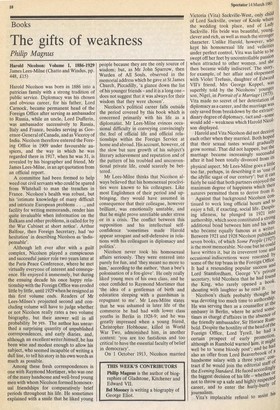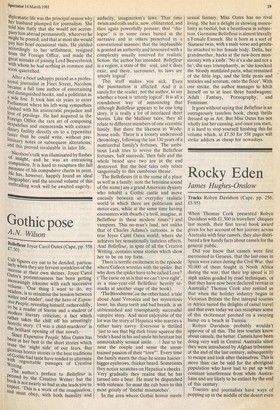Books
The gifts of weakness
Philip Magnus
Harold Nicolson: Volume I, 1886-1929 James Lees-Milne (Chatto and Windus, pp. 448, E15) Harold Nicolson was born in 1886 into a patrician family with a strong tradition of public service. Diplomacy was his chosen and obvious career, for his father, Lord Carnock, became permanent head of the Foreign Office after serving as ambassador to Russia, while an uncle, Lord Dufferin, was ambassador successively to Russia, Italy and France, besides serving as Governor-General of Canada, and as Viceroy of India. Nicolson therefore entered the Foreing Office in 1909 under favourable auspices, and the way in which he was regarded there in 1917, when he was 31, is revealed by his biographer and friend, Mr James Lees-Milne, in an apt quotation from an official report.
A committee had been formed to help weed out civil servants who could be spared from Whitehall to man the trenches in France. Nicolson's health was robust, but his 'intimate knowledge of many difficult and intricate European problems . . ., and facility for writing memorands, render him quite invaluable when information on the Balkans and other problems, is called for by the War Cabinet at short notice'. Arthur Balfour, then Foreign Secretary, had 'no hesitation' in describing Nicolson as 'indispensable'.
Although left ever after with a guilt complex, Nicolson played a conspicuous and successful junior role two years later at the Paris Peace Conference, where he met virtually everyone of interest and consequence. He enjoyed it immensely, but during the ensuing decade his once happy relationship with the Foreign Office was eroded little by little, until 1929 when he resigned as this first volume ends. Readers of Mr Lees-Milnes's projected second and concluding volume will have to judge whether or not Nicolson really rates a two volume biography, but their answer will in all probability be yes. The author has unearthed a surprising quantity of unpublished correspondences, and early diaries, and, although an excellent writerihimself, he has been wise and modest enough to allow his subject, who seemed incapable of writing a dull line, to tell his story in his own words as much as possible.
Among these fresh correspondences is one with Raymond Mortimer, who was one of the many handsome and well-bred young men with whom Nicolson formed homosexual friendships for comparatively brief periods throughout his life. He sometimes explained with a smile that he liked young people because they are the only source of wisdom; but, as Mr John Sparrow, then Warden of All Souls, observed in the memorial address which he gave at St James Church, Piccadilly, 'a glance down the list of his younger friends — and it is a long one — does not suggest that it was always for their wisdom that they were chosen'.
Nicolson's political career falls outside the period covered by this book which is concerned primarily with his life as a diplomatist. Mr Lees-Milne evinces occasional difficulty in conveying convincingly the, feel of official life and official relationships within the Foreign Service at home and abroad. His account, however, of the slow but sure growth of his subject's literary achievement and reputation and of the pattern of his troubled and unconventional private life, could scarcely be bettered.
Mr Lees-Milne thinks that Nicolson always believed that his homosexual proclivities were known to his colleagues. Like most Englishmen of their period and upbringing, they would have assumed in consequence that their colleague, however brilliant, was emotionally unstable, and that he might prove unreliable under stress or in a crisis. The conflict between this supposition and his intellectual selfconfidence 'sometimes made Harold appear arrogant and self-defensive in relations with his colleagues in diplomacy and politics'.
Nicolson never took his homosexual affairs seriously. They were entered into purely for fun, and `they meant no more to him,' according to the author, 'than a bee's polonisation of a fox-glove'. He only really liked young men of his own class, and he once confided to Raymond Mortimer that 'the idea of a gentleman of birth and education sleeping with a guardsman is repugnant to me'. Mr Lees-Milne states that he was ashamed in later life of the commerce he had had with lower class youths in Berlin in 1928-9; and he was greatly impressed when a young friend, Christopher Hobhouse, killed in World War Two, admonished him, in another context: 'you are too fastidious and too critical to have the essential faculty of belief in democracy'.
On 1 October 1913, Nicolson married Victoria (Vita) Sackville-West, only child of Lord Sackville, owner of Knole where the wedding took place, and of Lady Sackville, His bride was beautiful, young' clever and rich, as well as much the stronger character. Unlike Harold, however, wh° kept his homosexual life and velleities under perfect control, Vita was liable to be swept off her feet by uncontrollable passion when attracted to other women, and she then became wildly indiscreet. The story, for example, of her affair and elopement with Violet Trefusis, daughter of Edward VII's friend, Mrs George Keppel, was superbly told by the Nicolsons' younger son, Nigel, in Portrait of a Marriage (1973). Vita made no secret of her detestation of diplomacy as a career, and the marriage was only saved from breakdown by the extraordinary degree of diplomacy, tact and — some would add — weakness which Harold Nicolson displayed. Harold and Vita Nicolson did not deceive each other when they married. Both hoped that their sexual tastes would graduallY grow normal. That did not happen, but the marriage became increasingly successful after it had been totally divorced from as physical aspect. Mr Lees-Milne goes a little, too far, perhaps, in describing it as 'one oi the idyllic sagas of our century'; but it can fairly be said that both partners enjoyed th,e maximum degree of happiness which their natures permitted them to derive from it. Against that background Nicolson eon' tinued to work long official hours and !° enjoy a full, if exacting, social life. Des.Pising idleness, he plunged in 1921 int° authorship, which soon constituted a stro.ng additional bond between him and his wife who became equally famous as a writer; Between 1921 and 1928 Nicolson publisheo seven books, of which Some People (192"nd is the most memorable. No one but he cold have written it, but its irreverent tone an occasional indiscretions were resented. hY some of the top brass in the Foreign office; It had a resounding popular success. an Lord Stamfordham, George V's Pnvate, secretary, told Nicolson that he had founu the King, who rarely opened a book, shouting with laughter as he read it. Nicolson's chiefs probably thought .11e was devoting too much time to authorstuP. He was serving then as a counsellor at the embassy in Berlin, where he acted some: times as chargé d'affaires in the absence ot the friendly ambassador, Sir Horace ROI' bold. Despite the hostility of the head of the Foreign Office, Lord Tyrell, he had a certain prospect of early promouo although as Rumbold warned 10m, it InThd well be to 'some bloody pose; and he na also an offer from Lord Beaverbrook of 3 handsome salary with a three years' con.: tract if he would join the editorial sta.ff the Evening Standard. He faced accordingly the biggest decision of his life — whether °1-A not to throw up a safe and highly respecteu, ni career, and to enter the hurly-burly °I journalism. Vita's implacable refusal to assist his diplomatic life was the principal reason why her husband plumped for journalism. She told him flatly that she would not accompany him abroad permanently, wherever he might be posted; and that at most she would Pay him brief occasional visits. He yielded accordingly to her selfishness, resigned. from the Foreign Office, and made the great mistake of joining Lord Beaverbrook With whom he had nothing in common and soon quarrelled.
After a brief unhappy period as a professional journalist in Fleet Street, Nicolson became a full time author of entertaining and distinguished books, and a politician as a side line. It took him six years to enter Parliament where his left-wing sympathies Clashed with his aristocratic prejudice and love of privilege. He had acquired in the Foreign Office the rare art of composing despatches and memoranda with extraordinary facility directly on to a typewriter faster than he could write, without preliminary notes or subsequent alterations; and this proved invaluable in later life.
Nicolson's talk was illuminated by flashes of insight, and he was an entrancing companion. It is hard to recapture the full measure of his compulsive charm in print. He has, however, happily found an ideal biographer; and the second volume of this enthralling work will be awaited eagerly.







































 Previous page
Previous page